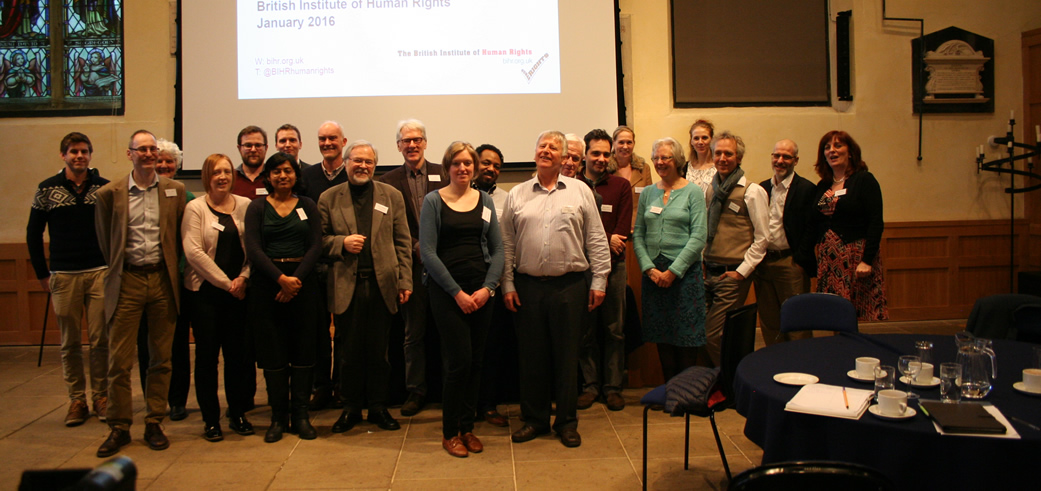Representatives from International Service have participated in a two-day workshop hosted by York Human Rights City Network (YHRCN).
YHRCN is a project that seeks to bridge the gap between international obligations and the everyday claiming of rights at a local level. Through networking organisations and individuals passionate about respecting rights in York, it seeks to create a culture of rights among citizens, businesses and York City Council, making York the UK’s first Human Rights City.
The workshop, titled ‘The Rise of Human Rights Cities, Why Cities? Why Now?’, held on January 13 and 14, had two main objectives: to explore the ways in which cities have sought to give meaning and content to the human rights label, and the potential for new and existing networks to support the development of human rights cities (HRCs) in the UK and Europe.
International Service has been involved with YHRCN since its inception in 2011, with representation on the Steering Group from two chief executives. Current chief executive, Jo Baker, attended the workshop and chaired two discussion panels.
She said: “I am really excited to be supporting York City of Human Rights Network, which will give us a platform that enables local people to access their own rights and hold duty bearers to account.”
Presentations during the two days included how to make rights human rights ‘real’ in cities, rights in health and social care, implications for activism in HRCs, education, and the use of indicators as a measure of progress. There were also case studies on giving the human rights label content, from YHRCN and the City of Utrecht in The Netherlands.
Barbara Oomen, a professor at Utrecht University, made the opening address about the rise of HRCs, referring to Utrecht’s status as the first HRC in The Netherlands. She also praised the efforts of those involved in YHRCN, saying: “I’m impressed with how York has been slowly moving forward towards a Human Rights City.”
Paul Gready, director of the Centre for Applied Human Rights and an International Service trustee, then outlined the history of the YHRCN as a case study for giving content to the HRC label, where he revealed that a research project had identified the five priority human rights YHRCN will focus on going forward. These are education, non-discrimination and equality, health, an adequate standard of living, and housing. The research took the form of public surveys and interviews with six York-based NGOs working with minority and disadvantaged groups in the city.
The following presentation by Hans Sakkers, who works for the municipality of Utrecht, was a case study in how the city had become the first HRC of The Netherlands. He said that setting up had involved exploring the meaning and examples of human rights in the city and attending international human rights network events.
The keynote address was made by Paul Hunt, a law professor at Essex University and expert on economic, social and cultural rights. In his speech on the implementation, progress and impact of HRCs, he emphasised the needs for specific actions to be identified and taken and for success to be measured to ensure progress.
The first day ended with a presentation by Helen Wildbore, from the British Institute of Human Rights (BIHR), outlining the articles contained in the Human Rights Act 1998 (which the Government plans to replace with a Bill of Rights) and the health and social care case studies of people the Act has helped. She said work by the national charity showed that a human rights approach empowered the most disempowered people, improved decision-making and reduced complaints over human rights issues.
One the second day, Michele Grigolo, from Nottingham Trent University, outlined how HRCs had implications for activism, and a final presentation, by Wolfgang Benedek, from Graz University, explored how education campaigns promoted knowledge and understanding of human rights.
Throughout the two days there were discussions about the costs involved with HRCs and who in the partnerships involved should be responsible for them, as well as how to ensure partnerships are accountable for their actions. There were also debates about HRC structures and how large a part politics and policy should play.
The workshop ended in a facilitated discussion on networks and how delegates could work together and support each other moving forward and, although a couple of those present were unsure how much they would be able to do once they got back to their offices, there was a definite consensus of desire to adopt a human rights approach.



